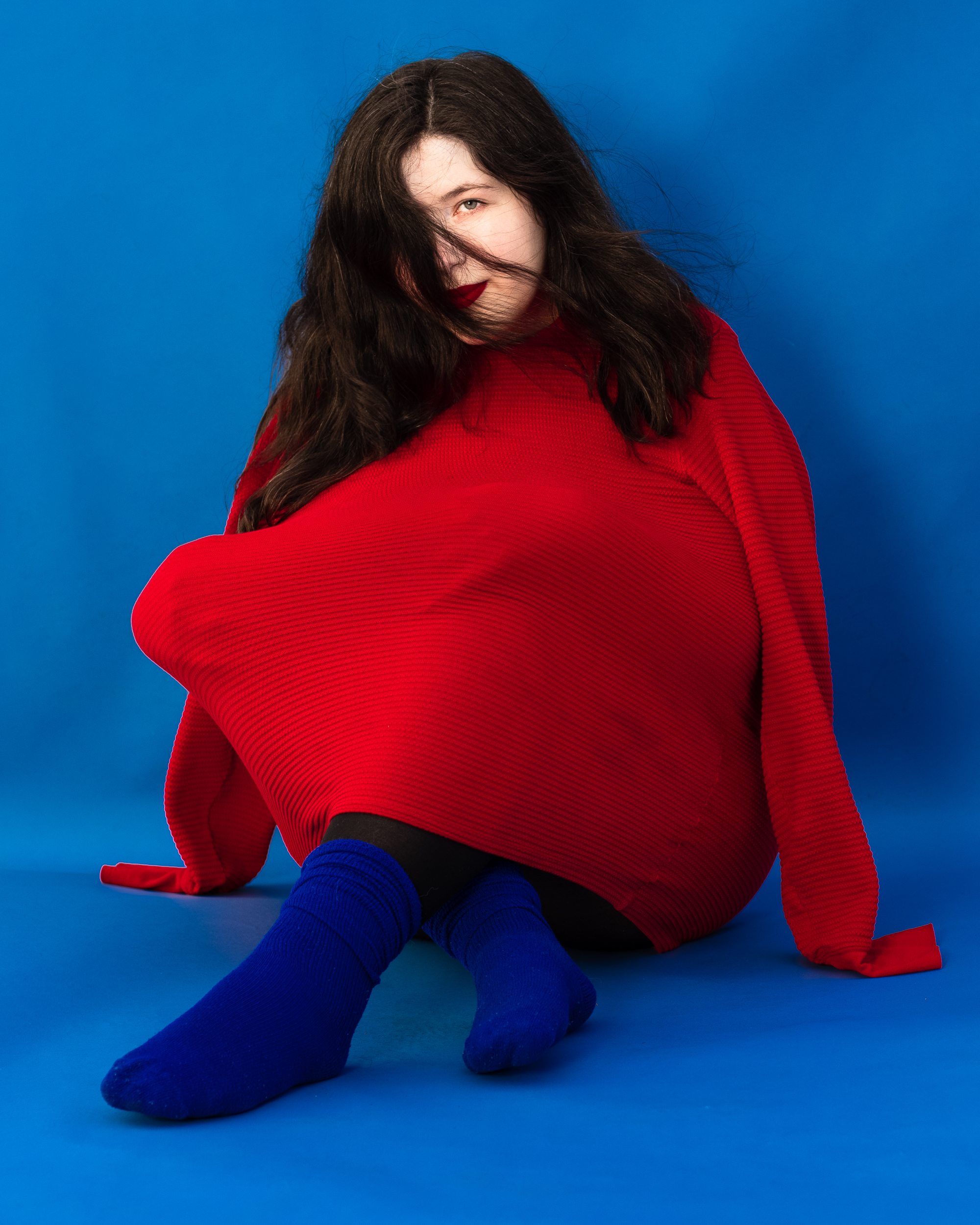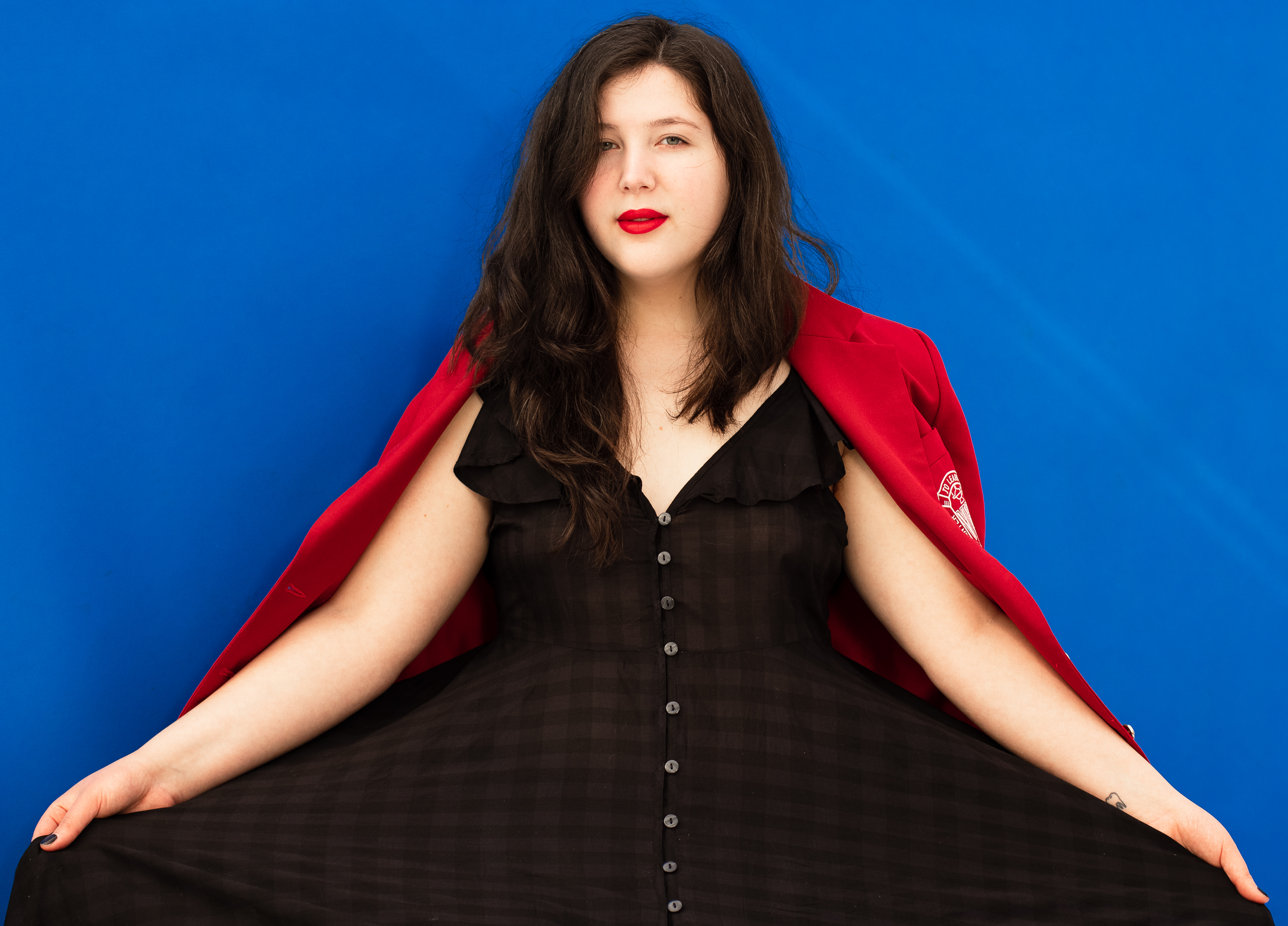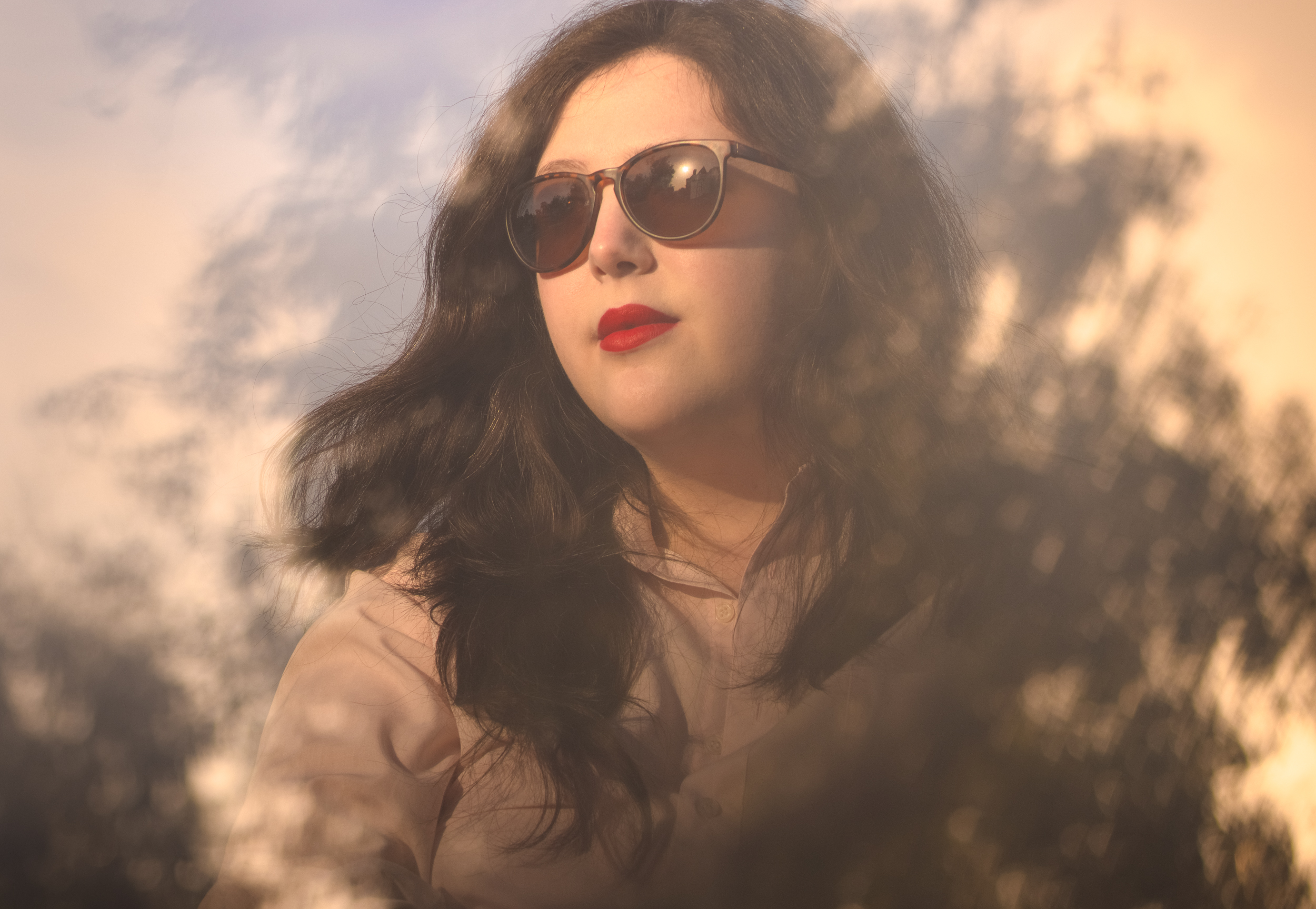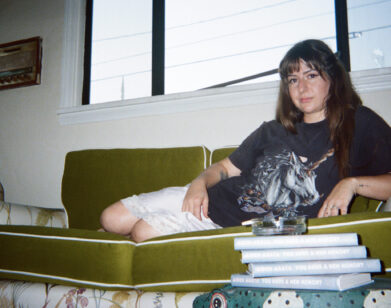In conversation
Lucy Dacus and Thandiwe Newton on Creative Solidarity and the Perfect Red Lip

“The fact that I missed when I was trending shows how off-trend I have always been,” tweeted Lucy Dacus, the Richmond-born singer-songwriter, a few days after her latest album release. ‘Trendy’ is certainly not the best word for Dacus’s music. Her new album Home Video sets the 26-year-old musician’s rich, velvety vocals against spare instrumentation, an era-less hybrid of the emotionally-laden folk ballads she’s known for and the tightly-produced indie pop bops of the moment.
Home Video represents a logical follow-up to Dacus’ first two critically-acclaimed studio albums. While the songs on her 2018 album Historian run anywhere from 4 to 8 minutes long, those on Home Video are meticulously packaged, revealing the crystalline clarity and empathy that accumulates with age. Over 11 tracks, Dacus renders her religious upbringing and suburban adolescence in visceral detail, dusting off memories of family scuffs, schoolyard crushes, and summer bible camp hijinks with equal parts frank honesty and achy nostalgia.
Despite the low profile she maintains, Dacus has some famous admirers: She has performed at rallies at the request of Bernie Sanders, opened for indie rock royals like Mitski and The National, and comprised one-third of the indie rock supergroup Boygenius (alongside Julien Baker and Phoebe Bridgers). This week, Dacus added the actress Thandiwe Newton to the list. To mark the release of Home Video, the pair hopped on the phone to discuss everything from the challenge of creating honest art to the perfect red lip. —MARA VEITCH
———
THANDIWE NEWTON: It’s so lovely to meet you. They’re only giving us half an hour, are you kidding me?
LUCY DACUS: [Laughs] I’d just like to chat.
NEWTON: Exactly. Are you in Richmond?
DACUS: I’m actually in Philly. I moved to Philly in the last three days of 2019, and thought I would be splitting my time. I love Richmond a lot, but I’d never lived anywhere else, so.
NEWTON: That’s great. I’ve been reading about you, and I know you have a kinship with Philadelphia. I love it there. I made a movie there, Beloved, which is based on Toni Morrison’s book.
DACUS: Wow.
NEWTON: That book is just a magnificent event. So I was in Philly for a long time and I was pretty young. It’s got a great energy, and you’re really close to New York, but it’s separate.
DACUS: I have a friend that describes it as a completely unpretentious city. When people are nice to you, you don’t have to wonder if they’re being two-faced and when people are mean to you, you know that they’re just being fully honest and uncomplicated.
NEWTON: The only two people I’ve ever been asked to interview are you and Gloria Steinem. Both things have made my eldest daughter incredibly proud. I was so thrilled to be asked to do this. From the moment I was eight I had my own voice, and I tend to supply instead of receive. But an artist like you, you make me feel things and think things. I was given a few guidelines, which I only just read just now. The first one is about how personal this album is, and whether it is hard to talk about. I love the fact that I’ve got these talking points because I would never ever have asked you that question.
DACUS: I mean, you don’t have to.
NEWTON: But part of what is so valuable to me in your work is the space between what you have given and how it’s received. That’s actually a very magical space. And if you attempt to explain that space, you kind of pollute it a bit . You’re also not in that context anymore that motivated you to write that song in the first place. It’s like you’ve given something, but then the listener does the rest on their own. It’s almost like giving them a responsibility for themselves. I’m saying this because I’ve read interviews with you where you mention that it’s hard for you when people need you or put their emotional burdens on you.
DACUS: I think you’re right. It’s uneven.
NEWTON: So it seems like, even if you did want to engage, it’s better that you leave people to find their own truths in the work that you created.

DACUS: My friend asked me last night, “Do you ever correct people when they understand a song incorrectly?” And I was like, no, because they’re just as right as me. That must be even more common as an actor because you’re representing another person.
NEWTON: The difference is that it’s not me. The most alarming experience I had with this was a few years after I did Crash, which exploded into the culture when it was released. This guy came up to me at an awards ceremony as we were going through the metal detector. He was like, “You should’ve stood up for your man.”
DACUS: Oh my gosh.
NEWTON: He was so angry, so I just stood and listened to him, obviously knowing that I’m not the character, and that I just had to let him be angry about his own stuff.
DACUS: Wow. He held on to that.
NEWTON: Yeah, obviously I was a trigger. I was just a trigger in a dress.
DACUS: That’s one of the heaviest things, actually. I’ve experienced something similar. I wrote a song about a breakup and people tend to listen to it when they’re going through a breakup. So then it carries all of this sadness for people, which means that when they interact with me, it’s like a trigger for that sadness.
NEWTON: When your first album came out, you’re 20 years old and hanging out with your friend who’s got some studio time in Nashville. Now, suddenly, it’s your full-time job.
DACUS: Yeah, I’m trying to enjoy it. Like, writing songs is the absolute easiest part of any of this. The task that I really want to feel good about this time around is being in my body and just showing up joyfully with confidence and ease.
NEWTON: I’ve always wondered about songwriters. Once you get signed suddenly it’s like, you now have a duty to write music. I just think, oh my god, that’s the absolute antithesis of art. It only thrives when you’re inspired. Writing is like an extension of your diary. I had a hideous boyfriend who read my fucking diary once.
DACUS: Oh no.
NEWTON: Oh yeah, and mocked me.
DACUS: Betrayal.
NEWTON: He defined betrayal. That was almost the turn on. The only other artist who I know works out of their diary is Stevie Nicks.
DACUS: For some reason, I don’t read about other musicians. I’m worried that I’ll start to walk on somebody else’s path, and also I really am so hurt by the threatening narrative of people who die too soon, who burn out. I really want to survive.
NEWTON: Well, you are that famous age, right? 26, 27. But the new album is just wonderful.
DACUS: Oh, I’m glad you got to hear it.
NEWTON: It’s so delicious that “Thumbs” is finally on there because you’ve been performing that live for years. That’s how we kind of met, or half-met.
DACUS: Oh yeah, on Twitter, right?
NEWTON: Yeah, because I was in Los Angeles trying to get my first movie off the ground, directing. I’d found out that you guys were performing in Oakland and I was so excited. And then my movie fell apart, so I didn’t get to Oakland and I was so sad that I didn’t get to come see Boygenius. That was my introduction to you.
DACUS: I mean, we want to play together again so bad. I think we’re so busy, but we would take any excuse, we miss each other so much.
NEWTON: Do you think you’ll record as Boygenius again?
DACUS: There aren’t any plans, but we talk all the time. I think we are the biggest Boygenius fans. We want it to happen, so we’re not working against it. Even last night we were all talking about the book that we all recently read called The Sympathizer by Viet Thanh Nguyen, I don’t know if you’ve heard of it.
NEWTON: Yes, I have it, I haven’t read it.
DACUS:It’s like a fireworks show, the entire book. You learn so much about the Vietnam War, capitalism, and communism. It feels really juicy.
NEWTON: Boygenius presents to me as one of the most powerful examples of solidarity and sisterhood that I’ve ever seen.
DACUS: I agree. I mean, I don’t know about most powerful, but to me, definitely.
NEWTON: It was described to me as a supergroup by my daughter who is the reason I know about you. She wanted me to hear the EP and I loved it. It felt to me like such a gift to each other. It’s not just about you three as friends, it’s about the power of the collaboration between women. When women see each other, and are seen, and protect each other, and support each other, it’s just so glorious.
DACUS: It felt like it should be a given. There’s so much implied competition that isn’t useful at all and just gives people ulcers and makes people feel entitled.
NEWTON: And unloved.
DACUS: Yeah.
NEWTON: The assumption is that you won’t be loved by that person that you admire. So you and Phoebe were already on Matador together, right?
DACUS: Me and Julien are on Matador.
NEWTON: Okay. So, how did your record labels feel about your collaboration?
DACUS: They didn’t really have a choice. We were going to be on tour together, so we recorded a song and it just turned into a whole EP, and they were like, “All right, well, put this out now.” We recorded in June and I think the first song came out in August, which is the tightest turnaround. For instance, I recorded Home Video in August, 2019, and it’s coming out June, 2021. And even writing, we wrote all those songs the day before, or during recording. I think we were all very surprised.
NEWTON: You really seem to be a safe harbor for people.
DACUS: I hope to be a part of people’s solace in whatever way. I’ve been thinking recently, it doesn’t even have to be music. Like, I could start a bookstore and that would be equally as fulfilling.
NEWTON: Absolutely. It doesn’t have to be music, but for you, it is. When you write things down, it’s amazing how it creates a resolution, isn’t it?
DACUS: Often I’ll write a song about something that happened five years ago, not knowing that all that time my brain had been working on a synthesis.

NEWTON: Yeah. You went to film school and decided it wasn’t for you. How come?
DACUS: Everyone else there had goals, and I think I was jealous of them because they wanted to make slasher films or be wedding videographers or something, whereas I was there because I didn’t want to choose, and film is everything. Film is performance, it’s writing, it’s editing, it’s directing. There’s color, there’s costuming, there’s music. It’s dream-building every time. I was attracted to every part of it, so I wanted to learn so much, but we were learning really specific things. Also it was humbling to realize like, okay, I can’t do everything alone. Whereas I wish I could just clone myself and make something. But I guess I write music alone. So that is something.
NEWTON: You directed the “Hot and Heavy” music video. I really saw you, and funnily enough, it informed me about how to interview you.
DACUS: Thanks. It came out exactly how I wanted it to, and I think it’s because I knew everyone involved. Everyone that was in it, my family, my friends, even the editor and cinematographer, is someone I went to middle school with. I feel such pride for it because I have so much pride for everyone involved. And just that the result is evidence of those relationships. How did it inform the way you decided to interview me?
NEWTON: You were going back to your heart, your home, your beginnings. And it was about how you’ve grown and expanded, and you’ve left Virginia and people have carried you all over the world, and you’re going back home. And how have you changed? And how do you fit back in? And what are you bringing back with you into that space?
DACUS: It’s so wonderful that you would make that connection. I didn’t want to do too much research, because I always like to meet people as they are. I’ve seen plenty of your films, but your Ted Talk about identity was so meaningful to me, and it makes me feel safe that you’re so thoughtful.
NEWTON: I’ve got so many things that we could touch on. Can I just talk about something dumb for a sec? What’s your favorite red lipstick?
DACUS: Oh my gosh. Well, the one that I’m on right now is Lisa Eldridge. I’m going to go get it really quick. I also love MAC Ruby Woo.
NEWTON: I love Lady Danger. Oh my god, it’s an absolute classic. It’s got more orange in it, so it’s quite brash. Oh it’s good.
DACUS: I make everything look too warm, so I often need like blue-toned, cool-toned stuff.
NEWTON: I’ll put Lady Danger on so you can see this. Look at that.
DACUS: I’m going to take a screenshot of us doing this.
NEWTON: How long have you been wearing it?
DACUS: Probably since like 2014 when I started playing shows. I’ve never worn makeup, and I only started to buy makeup this year. I think because if I change something about my appearance, I don’t know who I am. Whereas I know some people are like, if they don’t put on makeup, they don’t feel like themselves. Lipstick is the one thing I’ve incorporated that I’m like, “Okay, this makes sense.” For me, putting it on before a show makes me slow down. It’s the uniform. Also, the trick about red lipstick is that it makes everyone think you’re put together and that everything else about you is on purpose, whereas I’ll be wearing what I wore all day, jeans and a t-shirt, but I put on the red lipstick and it looks like I thought through everything. It’s magic.
NEWTON: I told my daughter I was speaking to you today, and she came over to the house with her notebook and it was the most beautiful thing, I wish you could have heard it. It was like a thesis of who you are and what you mean. Not just to her, but to people in general. She said, “Her voice sounds like someone telling a person ‘love you’ and knowing they’re not going to say it back.”
DACUS: That makes me emotional. That’s so nice.
NEWTON: Can I ask you about “Thumbs”? How did that song come together?
DACUS: That event happened in 2013 or 2014, our first year of college, when we lived together. And I wrote the song in 2018, so five years later, and I hadn’t realized that I needed to say something about it. And I wrote it in 15 minutes in a car ride and just broke down, because the last line, “You don’t owe him shit even if he said you did,” was something that I needed to hear myself.
NEWTON: Wow. So you were going through something and there was a similar need?
DACUS: Yeah. When I showed it to her, I was very nervous because obviously it’s about a relationship that is really fraught and traumatic for her. And I showed it to her with a snotty nose, crying, just pausing between verses and I felt like I needed to apologize because I was like, “I just used your life as material. I don’t know if it was my place. I’m sorry, I won’t record it if you don’t want me to but it’s there.” And she was like, “This isn’t a sad song. This is a song about our friendship.” And that’s what I carry with me. It’s a happy song.
NEWTON: It’s brave to have the courage to breach someone’s bubble.
DACUS: That was maybe the first time I really felt hate. One-on-one, not somebody from history long gone or anything. Like, “We’re three feet apart and I hate you.” I think at that point I had felt superior in some way to people because I somehow avoided that emotion. There were people that I thought were horrible but I always saw the potential for their growth. With this adult man at the time, I couldn’t do it. And so it was weirdly like a growing and humbling experience, too.
NEWTON: The fact that five years later you wrote about it must have meant that it almost registered, it was still filtering through your psyche. So that experience was a touchstone for your older self as you were going through stuff. Can we also just talk about “Pillar of Truth”? Who the fuck writes a rock song about their grandmother and it turns into a hit?
DACUS: I haven’t thought about that song in a while.
NEWTON: It’s my favorite.
DACUS: Aw. I was looking through some photos and saw a picture of me as a newborn baby with both of my grandmothers holding me. One of them passed and that’s the grandmother that “Pillar of Truth” is about. My other grandmother has dementia now. She was in the “Hot and Heavy” music video, and she doesn’t remember filming. So every time she sees the video it feels like the first time. It’s the same way with my music. She’ll hear my music and she’s moved every time.
NEWTON: It’s such a counterpoint to the narratives you hear so often from women in our industries about being exploited.
DACUS: I had people like that in Richmond. My ex is an example. We started dating in high school and on and off through college, and he’s like, “Everything you are is because of me.” And he works at Jimmy John’s, a sandwich shop.
NEWTON: It’s the insecurity and it’s the fear that actually you’re everything.
DACUS: Yeah. The project of finding yourself, that’s a daily thing. And so even if “everything you are is because of me,” okay, well tomorrow, I’m a new person. So then what?
NEWTON: It’s real gaslighting.
DACUS: I was so looking forward to our conversation. For whatever reason, I just sensed that it would be lovely to talk.
NEWTON: We’ve talked for triple the time we were supposed to.
DACUS: I should have been interviewing you this whole time. I just want to keep asking you things. Thanks for all your kindnesses. It was so refreshing that you wanted to just talk instead of ask the usual questions. I answer those all day long.
NEWTON: Oh, it was magic my darling. I hope we’ll both be receiving a lifetime supply of this red lipstick.






